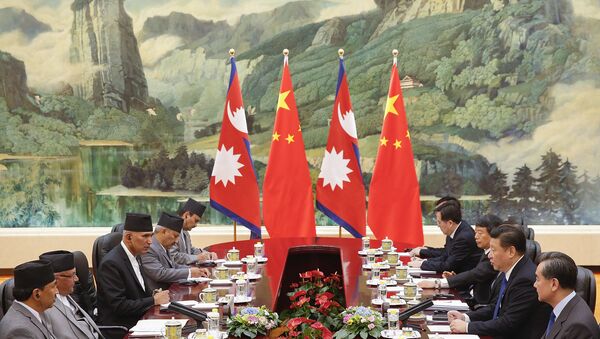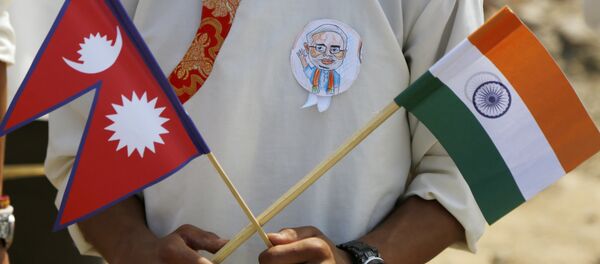As China rushed senior officials from the Communist Party to negotiate a truce between the warring factions of the Nepali Communist Party on Sunday, an Indian strategic affairs analyst has told Sputnik that keeping Prime Minister Khadga Prasad Sharma Oli in power in Kathmandu is in Beijing's interest.
"He [Oli] had been cosying up with China at many levels, which has caused concern for politicians across the spectrum, as they felt it was ill-timed and unnecessarily provocative to India, when it [India] was confronting the Chinese on its borders", states Colonel (retired) Ramani Hariharan, a former military intelligence specialist with the Indian Army and currently a member of the Chennai Centre for Chinese Studies.
"So without Oli in power as PM, China's influence is likely to be scaled down", explains Hariharan.
Hariharan points out that former prime minister and head of the ruling Communist Party Pushpa Kumar Dahal Prachanda was now directly threatening PM Oli's grip on the party and power.
"It should not be forgotten that Oli's bete noire, Prachanda, who played [a role] in bringing the constitutional impasse to an end, is no longer in coalition with Oli. This will affect Oli's electoral fortunes", underlines Hariharan, referring to Prachanda's efforts in forging a consensus on the new Constitution among rival factions.
On Sunday, a four-member Chinese delegation led by Guo Yezhou, the vice minister of the International Department of the Communist Party of China, landed in Kathmandu amid the ongoing political war within the Nepali Communist Party.
According to the English daily, The Kathmandu Post, Yezhou's delegation held meetings with Nepal's President Bidya Devi Bhandari and PM Oli on Sunday evening.
Yanqi had earlier this year also reportedly tried to broker a truce between Prachanda and PM Oli through a series of discussions. The meetings between the Chinese envoy and Nepali leaders had raised suspicions in New Delhi, which was last year replaced by Beijing as the top investor in Nepal.
Xi Jinping last year became the first Chinese president to visit Kathmandu in over two decades, a visit focused on enhancing connectivity between the two nations. Besides hailing the construction of the Trans-Himalayan Multi Dimensional Connectivity Network, a part of Beijing's One Belt One Road (OBOR) initiative, during his visit, Xi also pledged an investment of $500 million for repairing a crucial road damaged during the 2015 earthquake.
The push for forging greater connectivity between China and Nepal has been viewed by analysts as a strategy to reduce the land-locked Himalayan country's economic reliance on New Delhi.
The warming of ties between Nepal and China have coincided with deteriorating relations between New Delhi and Kathmandu, in the wake of a border row triggered by India inaugurating a road to a Hindu holy site in the Tibet Autonomous Region. While Nepal claims the road passes through its territory, New Delhi maintains the area in question is under its control.
"Oli's action [to dissolve the House of Representatives] follows a series of proactive initiatives from India, starting with a visit by India's external intelligence chief, army chief, and foreign secretary to Kathmandu and an official level meeting between the two sides, perhaps to tone down Nepal's high decibel actions over the border dispute", notes Hariharan, highlighting the ongoing efforts by New Delhi to resolve the border row.
Political Crisis in Nepal
Oli's decision on 20 December to dissolve the House of Representatives and his subsequent suggestion to hold a two-phase snap election on 30 April and 10 May has been sanctioned by President Bhandari.
Opposition parties and even some within the ruling outfit in the strategically-located Himalayan country, however, have described Oli's move as being unconstitutional. For instance, former Prime Minister Baburam Bhattarai has termed Oli's move as a "blot" on the nation's democracy.
The Standing Committee of the Nepal Communist Party, which is officially headed by Oli's intra-party rival Pushpa Kumar Dahal Prachanda, also issued a notice to the PM last week and threatened him and his supporters with expulsion over his recent decisions.
After more than a dozen petitions were filed with the Supreme Court against Oli's 20 December call, the country's top judicial institution issued a show-cause notice to Oli last week and sought an explanation from the 68-year-old politician.





